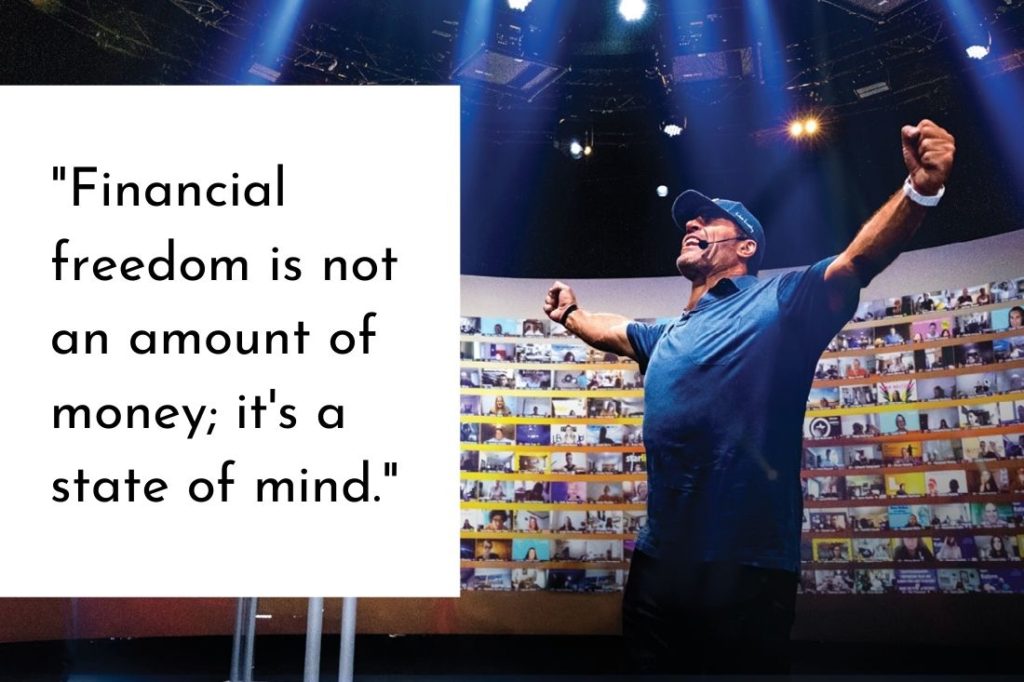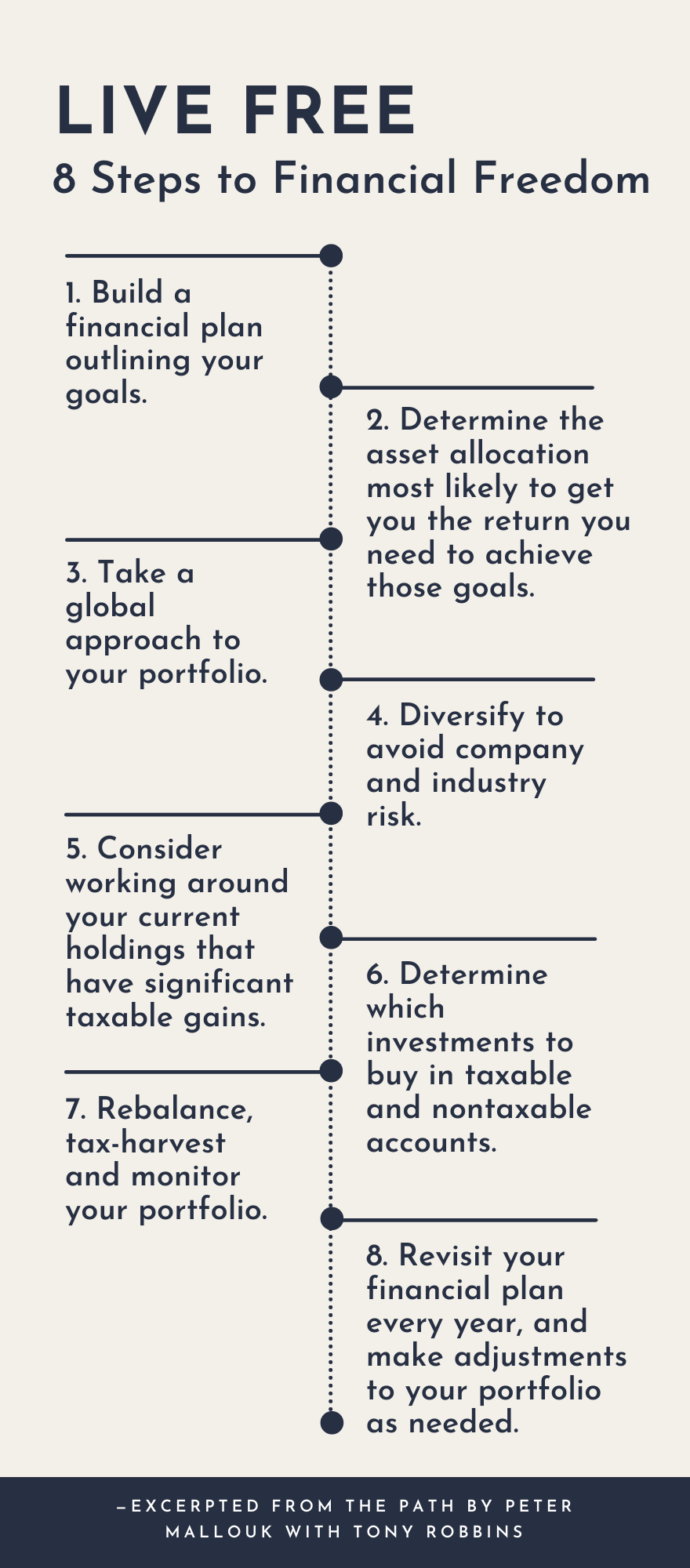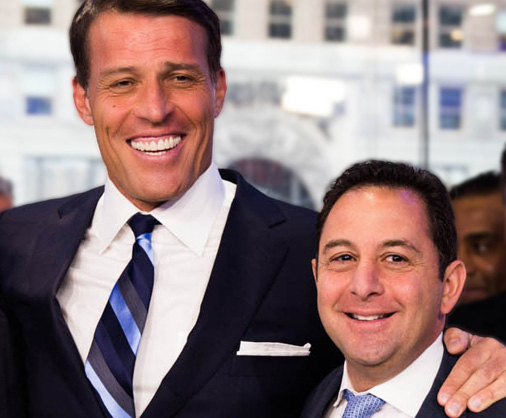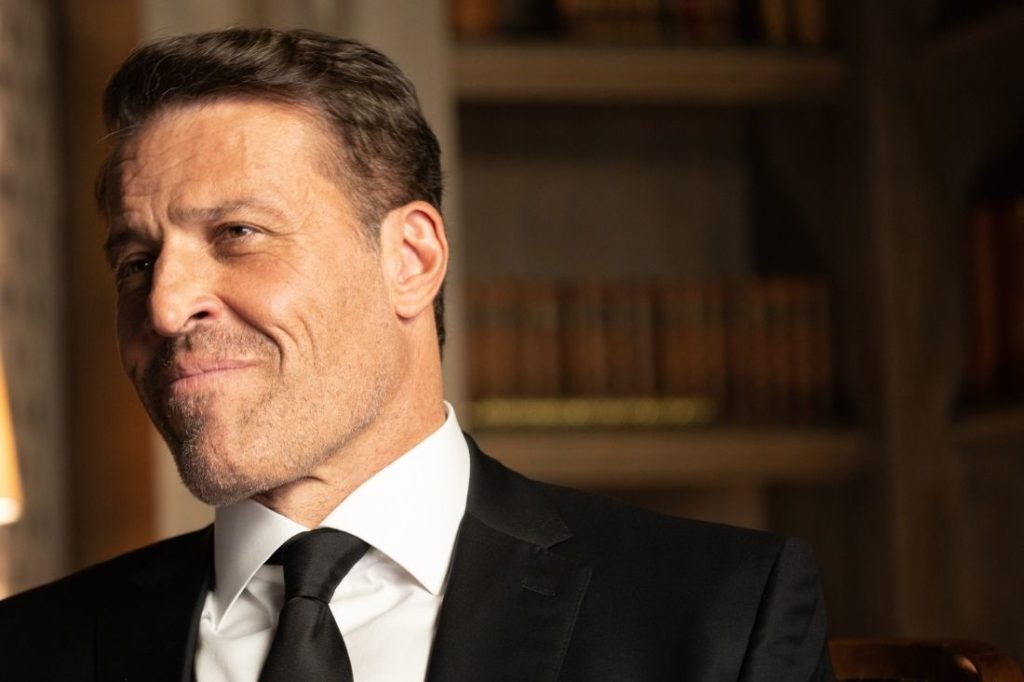The sharpest-shooting basketball player in the world, Stephen Curry, forces himself to make 10 straight free throws at the end of every training session. Legendary musician Yo-Yo Ma plays his cello every single day, even if it’s just for a few minutes. And famously prolific novelist Jodi Picoult makes sure she gets some words down on paper each day no matter what.
Practice makes perfect for nearly everything in life, and personal finance is no exception. It takes decades of work to achieve the financial goals we set for ourselves. Often, this lifelong journey involves a trusted advisor who can help us stay on track toward our goals. Tony Robbins has spent more than 40 years cultivating the wisdom necessary to be that guide for millions of people.
Through the years, Robbins, 61, has remained true to his singular mission: ending suffering and bringing joy to people across the globe. A major part of that mission involves helping everyone—from business magnates to everyday people—achieve financial freedom. His personal finance book MONEY Master the Game is the best-selling financial book of the 21st century. In 2020, Robbins collaborated with Peter Mallouk to write The Path: Accelerating Your Journey to Financial Freedom, which offers a detailed guide for achieving one’s financial goals.
Mallouk is the president and CEO of Creative Planning, a financial services company that oversees more than $69 billion in assets. Based in Overland Park, Kansas, Barron’s has ranked Creative Planning as the No. 1 independent wealth management firm for three straight years.
Robbins, well… he doesn’t really need an introduction. The personal development powerhouse and five-time SUCCESS cover figure is involved in more than 70 businesses that gross $6 billion in annual sales. His net worth is estimated at $600 million. He’s coached millions of people—including top professional athletes, billionaires and every living president—and has written five New York Times best-sellers.
Although the tangible advice from the most recent book will help anyone become a shrewd investor, it’s important to remember one thing: Financial freedom isn’t just about money.
“We all want to be truly free,” Robbins writes in The Path. “Free to do more of what we want, when we want, and to share it with those we love. Free to live with passion, with generosity, with gratitude and with peace of mind. This is financial freedom. It’s not an amount of money; it’s a state of mind.”

Trust Your Brain, Not Your Gut
Earlier this year, the world was stunned when thousands of retail investors, organized initially on the subreddit WallStreetBets, drove up the price of a seemingly doomed stock, GameStop, to more than $400 per share. Their goal was to force the hedge funds shorting the stock to protect their losses, thus driving GameStop’s price even higher. The little guys succeeded in the short-term, with some who were in on the squeeze early amassing huge gains while Wall Street furrowed its brow. However, the price of GameStop stock inevitably plummeted, and many amateur investors trying to get in on the rush ended up losing money, too.
It was the strangest bubble the internet ever did create, at least until it happened again with meme cryptocurrency Dogecoin a couple of days later.
If you take one lesson from the GameStop episode, Robbins says, let it be this: Impulsive financial decisions are never wise because they’re driven by two negative emotions—fear and greed. “Investing for emotion always ends in disaster, no exception,” he says.
You might be thinking, Hold on a second, that’s not true—I know someone who got rich through a lucky investment. Robbins says their situation is likely much more nuanced than you realize. “If someone actually got rich overnight, you didn’t see what they did for 10 years prior to that moment to be in that position,” he says.
We all crave the thrill that accompanies a quick financial win, but when it comes to your investments, time is your best friend.
If you begin investing at a young age, your money will grow exponentially due to the power of compound interest, which allows you to earn interest on top of your interest. “We must tap into the power that Albert Einstein called the eighth wonder of the world: compound interest,” Mallouk says.
In addition to compound interest, investing in a tax-deferred retirement account at a young age can provide significant long-term returns. Let’s say your goal is to have $1 million by age 65. If you start putting aside money in a retirement account with a 7 percent annual return at age 20, you’ll only need to put aside $272 per month to hit your goal. If you wait until you’re 50, you’ll have to put aside $3,099 per month.
Watching your money grow slowly and steadily over many years is easier said than done. The No. 1 financial mistake people make is panicking and selling, Robbins says. People think big events like 9/11, the financial crisis of 2008 and the COVID-19 pandemic will cause lasting economic damage. But no matter what, the economy always bounces back.
“When things are going well, people think it’s going to be springtime forever,” Robbins says. “When things are dark and stormy, they think it’s going to be wintertime forever. But I’m a student of history, and it’s always cyclical.”
For example, take the financial crisis of 2008. Millions of people pulled their investments at the first sign things were going downhill. Those who trusted the process and didn’t touch their money prospered: The market is now up seven-fold from the lows it reached in 2008. “It’s not timing the market, but time in the market that’s going to get you financial security and freedom,” Robbins says.
Cultivate Patience
Mastering your finances is just like mastering your mindset—it doesn’t happen overnight. It takes years, if not decades, to see a true transformation. “I think the secret to patience is knowing what your outcome is and focusing on still making progress,” Robbins says. “It’s about momentum and being a student of what works.”
These five strategies can help you stay on track toward your long-term financial goals:
1. HOME in on what matters.
Be strategic about the financial news you consume. If you have investments in the stock market, there’s no need to check the Dow Jones every day. You will only drive yourself crazy. Instead, spend those 30 minutes doing something valuable like reading a book about financial strategy.
“We’re drowning in information but starving for wisdom,” Robbins says. “The only way to stay strong and centered is to be clear on what you want to serve, stand guard at the door of your mind, and make sure you’re feeding your mind something besides clickbait.”
2. LEARN to be comfortable with risk.
Even the safest investments have a level of risk—tolerating it is simply part of the game. “Risk is the secret to success,” Robbins says. “If you want to succeed at any level—in business, in finance, in your contribution to the world—you have to learn how to deal with this four-letter word.”
Most financial experts believe the younger someone is, the riskier their investments should be (e.g. more stocks) and the older someone is, the more conservative their investments should be (e.g. more bonds). Mallouk says there are no universal absolutes, however. “It doesn’t matter how old you are—investments should be based on goals and what we’re trying to accomplish,” he says.
3. FOCUS on what you already have.
When Robbins asks crowds at his events whether they focus more on what they currently have or what’s missing, 80 percent say the latter. This isn’t surprising—high achievers tend to focus on self-improvement.
But if you’re always focused on what’s missing, you’ll never be able to attain true happiness, Robbins says. Change your mindset to focus on what you do have: Perhaps you don’t possess enough money to travel and donate as much as you would like to charity, but you do possess enough to pay for a sizable share of your child’s college. That’s big.
4. DON’T MAKE impulsive decisions.
If you find yourself tempted to make rash decisions with your money, you’re not alone. “Humans aren’t really wired to be great investors; it’s just not the way we are built,” Mallouk writes in The Path. “We tend to be wary of change but also impulsive, and we often make decisions based on emotions or intuition rather than facts.”
The next time you’re tempted to make a big financial decision like selling stock, buying an investment property or borrowing against your 401(k), give yourself one week before you pull the trigger. There’s a good chance you’ll change your mind once you’ve cooled off and thought logically about the situation.
5. KNOW your limits.
The world’s most skilled investors didn’t make it big due to one or two lucky investments—they’ve spent their lives learning how to be the best at what they do.
Robbins references a conversation he once had with billionaire hedge fund manager Ray Dalio. “This is harder than the Olympics,” Dalio told him. “With the Olympics, you train for four years and compete with the best in the world. This is 24-hour days playing against the best on Earth, and you’re not going to win.”
Adjust Your Worldview
With the volatility of the stock market, political division across our country and unpredictability of the pandemic, it can often feel like we’re living during a terrible time in history. But a little dose of perspective can remind us that’s not necessarily the case.
Mallouk often tells clients about what it was like to live in London in 1858. Our modern romanticism about the Victorian Era misses some noteworthy truths: People had been dumping waste in the river for years, and things finally reached a tipping point that year. During a scorching hot summer, the entire city reeked—not to mention millions fell ill from contaminated water.
“I tell that story because I’m so tired of hearing people say how bad things are today, and how they wish for the good old days,” Mallouk says. “It’s not that long ago that there was no TV, no radio, no air-conditioning, no plumbing and no clean water. This is the greatest time ever to be alive.”
It’s human nature to see things with a negativity bias, Mallouk says. But it’s important for investors to have an optimistic outlook on the world. “If you accept that it’s a great time to be alive—life expectancy is going up, the population is growing, we’re innovating and we’re getting better every year—then that’s the kind of place where companies can thrive,” Mallouk says. “And if companies thrive, you’re going to do well as an investor.”
Those who choose to view the world through an optimistic lens will prosper, according to Robbins. “Some people freeze to death in the winter,” he says. “Other people learn how to snowboard and spend time with their family by a warm fire because they know winter is not forever.”

Guiding Philosophies:
The Best Money Advice Tony Robbins Ever Received
“For things to change, you need to change.”
When Robbins was just 17 years old, he attended a seminar by personal development master Jim Rohn. This simple piece of advice from Rohn always stuck with him. “This philosophy has helped guide my life to a great extent,” Robbins says.
“Work harder on yourself than anything else.”
As a young man, Robbins expressed frustration to his father about how unfair it was that some people earned minimum wage while others made millions. His father said something that always stuck with him: “If you work at McDonald’s, you’re going to make minimum wage because anyone can learn to do that job quicky,” his father said. “But if a hedge fund manager can double someone’s money in two-and-a-half years, he’s providing hundreds of millions of dollars of value.”
“Great opportunities come every 15 minutes.”
This piece of advice came from billionaire investor Richard Branson, who chooses to live with an abundance mindset as opposed to a scarcity mindset. “Because that’s Branson’s belief, he always looks for opportunities,” Robbins says.
“The real secret to life is finding a way to add more value.”
Robbins learned this sage piece of advice from Bill Gross, co-founder of PIMCO and the only person in history to found seven companies and exit them at over $1 billion. “What I love about him is that he’s not saying, ‘How do I use this to get something for me or punish somebody I don’t like?’ ” Robbins says. “He’s saying, ‘What can I do for the world?’ ”

4 Investing Musts
Stick to these tried-and-true best practices:
1. Have a clearly defined plan.
This doesn’t have to be a 150-page document, but rather a straightforward outline of your finances. Start by creating a net worth statement, then identify your financial goals (with or without the help of an advisor) and create a customized portfolio.
2. Make sure your investment portfolio aligns with your goals.
Instead of thinking, I should invest in Apple today, for example, think about your long-term goals (such as saving enough to have $100,000 per year in retirement) and ask yourself what types of investments will get you there.
3. Revisit your plan.
You should revisit your financial plan annually and during big life events. There’s a good chance your investing goals will change over the years. Maybe you planned on having one baby and you had triplets, or you decide you’d like to retire earlier than you thought. Make adjustments as necessary.
4. Don’t mess it up.
Once you have your portfolio in place, stay disciplined. Don’t let your emotions interfere with your long-term objectives.
—Adapted from The Path by Peter Mallouk with Tony Robbins
This article originally appeared in the May/June 2021 issue of SUCCESS magazine.
Photos Courtesy of Tony Robbins



